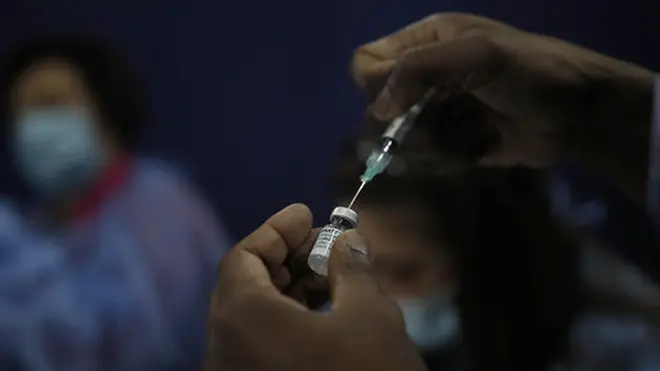
Iain Dale 7pm - 10pm
1 April 2021, 20:05 | Updated: 2 April 2021, 07:11

The World Health Organization has said the rollout of coronavirus vaccines in Europe has been "unacceptably slow" and urged the region to "speed up the process".
A WHO report also reads that coronavirus "variants of concern" are continuing to spread.
Dr Hans Henri P. Kluge, WHO Regional Director for Europe, said: "Vaccines present our best way out of this pandemic. Not only do they work, they are also highly effective in preventing infection. However, the roll-out of these vaccines is unacceptably slow."
"Let me be clear: we must speed up the process by ramping up manufacturing, reducing barriers to administering vaccines, and using every single vial we have in stock, now," he said.

'We don't know how robust our defences are against another Covid wave'
READ MORE: Germany and Canada suspend AstraZeneca vaccine over safety concerns
READ MORE: Digital vaccine certificates for European travel 'ready in June at latest'
Last week saw increasing transmission of Covid-19 in the majority of countries in the WHO European Region, with 1.6 million new cases and close to 24,000 deaths.
The Region remains the second most affected by SARS-CoV-2 of all the world’s regions, with the total number of deaths fast approaching 1 million and the total number of cases about to surpass 45 million.
Vaccination rollouts in much of Europe have been hit by delays. To date, only 10% of the Region’s total population has received 1 vaccine dose, and 4% has completed a full vaccine series.
In the UK more than half of the adult population has now received a first vaccination against Covid-19.

Four in 10 elderly black people not getting jab is 'high and concerning', business secretary says
Kluge’s appeal came as the WHO’s Regional Emergency Director for Europe, Dr Dorit Nitzan, said the Covid-19 situation in Europe was now "more worrying than we have seen in several months".
"Only 5 weeks ago, the weekly number of new cases in Europe had dipped to under 1 million, but now the Region’s situation is more worrying than we have seen in several months," she explained.
Dr Nitzan added: "There are risks associated with the increased mobility and gatherings over the religious holidays. Many countries are introducing new measures that are necessary and everyone should follow as much as they can,".
A total of 27 countries in the Region are in partial or full nationwide lockdown, with 21 imposing nighttime curfews.
In the past 2 weeks, 23 countries have intensified restrictions while 13 have eased measures, with an additional 9 to follow suit.